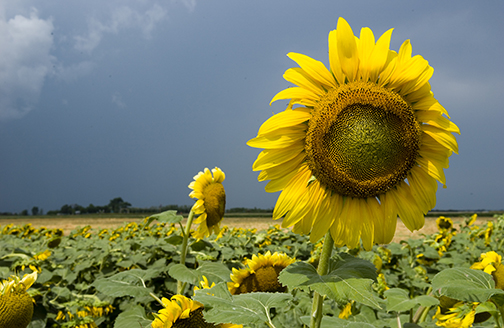
General Agriculture
This is an archived copy of the 2018-19 catalog. To access the most recent version of the catalog, please visit https://catalog.ndsu.edu.
General Agriculture Major
The degree program in General Agriculture is designed to serve students who wish to pursue a college education in several broad areas of agriculture or who want to tailor a program to meet their specific career objectives. Traditionally, students interested in careers focusing on agricultural production follow the General Agriculture curriculum or pursue majors in Animal Science, Crop and Weed Science, Equine Science or Horticulture.
Students electing to graduate with a General Agriculture major must file a "plan of study" with the General Agriculture Coordinating Committee by the third week of the semester in which they will complete at least 75 credits. This plan must an outline of courses to be taken to meet the disciplinary requirements and the Agriculture electives, for completion of the General Agriculture degree. Identification of the capstone course and any internship that the student plans to take should also be included in the plan of study.
The General Agriculture major is also a good approach to pursuit of a degree in Agricultural Education. A student may choose General Agriculture as a first major and Agricultural Education as a second major and complete the requirements for both degrees.
General Agriculture Minor
A minor in General Agriculture may be obtained by satisfactorily completing 24 credits with at least six credits in each of any four disciplines offered by the College of Agriculture, Food Systems, and Natural Resources. A minimum of eight credits must be taken at NDSU. Students must earn a 2.00 minimum GPA in the courses used to satisfy the minor requirements.
Plan of Study
Please note this is a sample plan of study and not an official curriculum. Actual student schedules for each semester will vary depending on start year, education goals, applicable transfer credit, and course availability. Students are encouraged to work with their academic advisor on a regular basis to review degree progress and customize an individual plan of study.
| First Year | |||
|---|---|---|---|
| Fall | Credits | Spring | Credits |
| AGRI 189 | 1 | ENGL 120 (Category C) | 3 |
| ENGL 110 (Category C) | 4 | COMM 110 (Category C) | 3 |
| MATH 103 (or higher level Math) | 3 | Gen Ed Social & Behavioral Science and Global Perspectives (Categories B & G) | 3 |
| CHEM 117, 121, or BIOL 111 (Category S) | 3 | CSCI 114 or MIS 116 (Category S) | 3 |
| CHEM 117L, 121L, or BIOL 111L (Category S) | 1 | Gen Ed Wellness (Category W) | 2 |
| ANSC 114 (or other lower division class with CAFSNR prefix) | 3 | PLSC 110 (or other lower division class with CAFSNR prefix) | 3 |
| 15 | 17 | ||
| Second Year | |||
| Fall | Credits | Spring | Credits |
| Gen Ed Social & Behavioral Sci (Category B) | 3 | STAT 330 (Category R) | 3 |
| Discipline 1 class | 3 | Gen Ed Hum & Fine Arts (Category A) | 3 |
| Discipline 2 class | 3 | Discipline 1 class | 3 |
| Discipline 3 class | 3 | Discipline 2 class | 3 |
| Discipline 4 class | 3 | Discipline 3 class | 3 |
| Elective | 1 | Elective | 1 |
| 16 | 16 | ||
| Third Year | |||
| Fall | Credits | Spring | Credits |
| Gen Ed Humanities and Fine Arts and Cultural Diversity (Categories A & D) | 3 | Upper division Discipline 1 class | 3 |
| Gen Ed Upper Division Writing (Category C) | 3 | Upper division CAFSNR elective | 3 |
| PLSC 315 (Category S) | 3 | Discipline 4 class | 3 |
| Discipline 1 class | 3 | CAFSNR elective | 3 |
| Discipline 4 class | 3 | CAFSNR elective | 3 |
| Elective | 1 | Elective | 1 |
| 16 | 16 | ||
| Fourth Year | |||
| Fall | Credits | Spring | Credits |
| Upper division Discipline 1 class | 3 | Capstone class (any CAFSNR prefix) (Course description contains the word "capstone") | 3 |
| Upper division Discipline 2 class | 3 | Upper division Discipline 2 class | 3 |
| Upper division Discipline 3 class | 3 | Electives | 10 |
| Discipline 4 class | 3 | ||
| Upper division CAFSNR elective | 3 | ||
| Elective | 1 | ||
| 16 | 16 | ||
| Total Credits: 128 | |||
CAFSNR - College of Agriculture, Food Systems and Natural Resources - Prefixes include AGEC (Agricultural Economics), ABEN (Agricultural and Biosystems Engineering), ASM (Agricultural Systems Management), AGRI (Agriculture), ANSC (Animal Science), ECON (Economics), ENT (Entomology), SAFE (Food Safety), MICR (Microbiology), PPTH (Plant Pathology), PLSC (Plant Sciences), RNG (Range Science), SOIL (Soil Science), VETS (Veterinary Science).
"Category" refers to the General Education categories (https://bulletin.ndsu.edu/academic-policies/undergraduate-policies/general-education/#genedcoursestext )
"Discipline" refers to the four CAFSNR disciplines which must be included in a General Agriculture curriculum. A discipline may be thought of as a prefix. Some prefixes can be combined to form a discipline. If a student chooses to have Agricultural Education as a second major, one of the disciplines may include the required education courses in the College of Human Development and Education.
